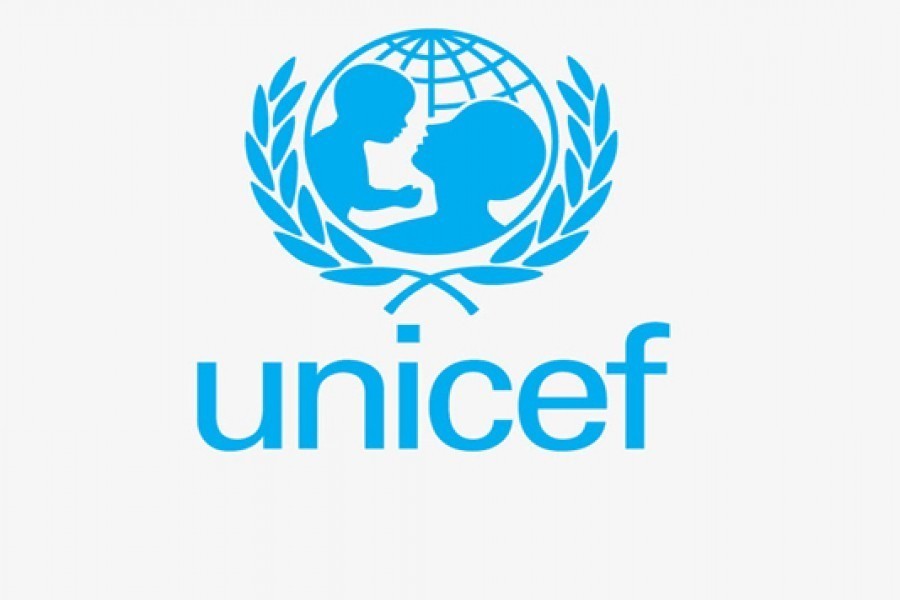COVID-19 impact
3.9m children under five likely to suffer from wasting disease in South Asia

Published :
Updated :

UNICEF has called for accelerated action to prevent and treat malnutrition caused by the COVID-19 pandemic as humanitarian community appeals for $2.4 billion to improve maternal and child nutrition globally.
An additional 3.9 million children in South Asia under the age of five could suffer from wasting – and therefore become dangerously undernourished – in 2020 as a result of the socio-economic impact of the COVID-19 pandemic, UNICEF warned on Tuesday in a statement.
Apart from this, in Bangladesh, admissions for treating severely wasted children with medical complications were down to 10 per cent in April 2020 compared with pre-pandemic levels. While essential nutrition services have now started to resume, they have not returned to prior capacity. In June 2020, admissions were at 56 per cent compared with what they were before the start of the pandemic.
According to an analysis published in The Lancet, 6.7 million children globally could suffer from wasting and over half (58 per cent or 3.9 million) would be from South Asia alone.
Wasting, which makes children too thin and weak, is a life-threatening form of malnutrition. It puts them at greater risk of dying, poor growth, development and learning. According to UNICEF, even before the COVID-19 pandemic, 47 million children were already wasted in 2019. Without urgent action, the global number of children suffering from wasting could reach almost 54 million over the course of the year. This would bring global wasting to levels not seen this millennium.
The Lancet analysis finds that the prevalence of wasting among children under the age of five could increase by 14.3 per cent in low- and middle-income countries this year, due to the socio-economic impacts of COVID-19. Such an increase in child malnutrition could translate into an increase from 1.7 million children wasted in 2019 in Bangladesh to 1.9 million in 2020.
“Malnutrition could exacerbate the effects of COVID-19 in mothers and children and make the current crisis an inter-generational one. Greater effort is needed to make sure that essential nutrition services are operating at full capacity, and that parents feel safe to bring their children to health facilities for screening and treatment,” said Tomoo Hozumi, UNICEF Representative in Bangladesh.
To improve continuity of essential nutrition services in Bangladesh, UNICEF supports the Government and other stakeholders to increase vitamin A supplementation, treat children with severe wasting, promote improved young child feeding, and provide micronutrient supplements to pregnant women.
“It’s been seven months since the first COVID-19 cases were reported and it is increasingly clear that the repercussions of the pandemic are causing more harm to children than the disease itself,” said UNICEF Executive Director Henrietta Fore. “Household poverty and food insecurity rates have increased. Essential nutrition services and supply chains have been disrupted. Food prices have soared. As a result, the quality of children’s diets has gone down and malnutrition rates will go up.”
The estimated increase in child wasting is only the tip of the iceberg, UN agencies warn. COVID-19 will also increase other forms of malnutrition in children and women, including stunting, micronutrient deficiencies and overweight and obesity as a result of poorer diets and the disruption of nutrition services. UNICEF reports from the early months of the pandemic suggest a 30 per cent overall reduction in the coverage of essential – and often life-saving – nutrition services globally. In some countries, these disruptions have reached 75 per cent to 100 per cent under lockdown measures.
In a commentary to The Lancet report, also released today, the heads of UNICEF, the Food and Agriculture Organization, the World Food Programme and the World Health Organization warned that the COVID-19 pandemic is undermining nutrition across the world particularly in low- and middle-income countries, with the worst consequences being borne by young children. More children and women are becoming malnourished due to the deteriorating quality of their diets, the interruption of nutrition services, and the shocks created by the pandemic.
Humanitarian agencies globally immediately need USD $2.4 billion to protect maternal and child nutrition in the most vulnerable countries from now until the end of the year.
The heads of the four United Nations agencies appeal to governments, the public, donors and the private sector to protect children’s right to nutrition by: Safeguarding access to nutritious, safe and affordable diets as a cornerstone of the response to COVID-19 by protecting food producers, processors and retailers; discouraging trade bans; and designating food markets as essential services;
“We cannot allow children to be the overlooked victims of the COVID-19 pandemic,” said Fore. “We must simultaneously think both short and long term, so that we not only address the challenges posed by the pandemic and its secondary impacts on children, but also chart a brighter future for children and young people.”
sajibur@gmail.com


 For all latest news, follow The Financial Express Google News channel.
For all latest news, follow The Financial Express Google News channel.